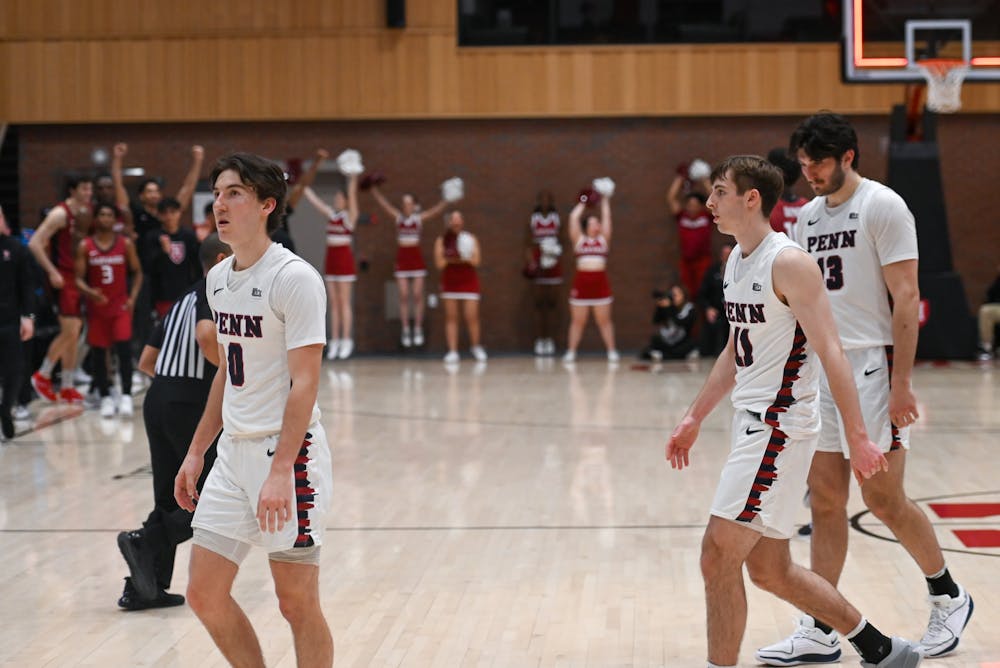
Penn men's basketball walks after the court after losing to Harvard on Feb. 24.
Credit: Nathaniel SirlinYou win some, you lose some — but sometimes you lose enough to miss out on Ivy Madness.
On Friday night, Penn men's basketball completed the series sweep against Dartmouth. And while freshman guard Sam Brown finished with a stellar 26 points off 6-7 from the three-point range, the strong showing was not as sweet of a victory as it could have been: the victory was 48 days in the making and a loss came just 24 hours later.
With Harvard, Columbia, and Brown all battling for the coveted fourth seed in Ivy Madness and Penn sitting behind them with only two conference wins to its name, the loss also marks an official elimination from the conference tournament.
In the loss against Harvard, it was the inconsistencies that had plagued the Quakers all season coming back to haunt them.
The biggest inconsistency of all goes back to Dec. 30: the lineup. It was on that dark day that senior guard Clark Slajchert went down with an ankle injury that kept him out of play until Feb. 10. The team’s do-it-all, literal Superman was gone.
No Slajchert in the lineup has meant that Brown and fellow freshman guard Tyler Perkins have been needing to take the reins offensively. And they are talented players. They have showed every game this season how they could be such a dangerous duo in the future.
Take this weekend for example. Brown and Perkins both had incredible games. Brown put up 26 points with a deadly three-point accuracy and Perkins outdid the highly touted Harvard freshman Malik Mack with 17 points at what felt like their biggest moments of the season (Mack finished with 15 points – 11 of which were from the line). But it cannot be an either-or situation. It cannot be either Brown or Perkins going off while the other has a quiet night. This partially stems from how when either are hot, they can fall into the habit of drawing up isolation plays for themselves, dancing on the three-point line and then driving in for the basket. It works, but the ball dominance limits the flow of the offense.
This weekend marks the first time this season that neither started the game. While the bench role did not hold them back and provided an opportunity for stronger defensive players like junior guard George Smith to withhold other teams’ scoring early on, it is just another inconsistency of this season. It was the same thing this weekend — with just one minute left and Penn within striking distance of the lead, Perkins was taken out of the game.
Furthermore, this weekend really highlighted the weakness of the team's offensive interior game.
Junior forward/center Nick Spinoso is one of the veteran leaders on this team, being one of only two returning starters from last season, but this season has not been his strongest showing. In the world of the ever-revolving big man, Spinoso is more assist-oriented than the archetype center. And while it has worked — he finds the open man on the wing more often than not — the strategy has been slowing the offense down at times. Spinoso likes to back down into the opposing center, which has led to as many frustrating turnovers as productive assists.
To his credit, Spinoso came alive in that second half against Harvard. He pulled down huge offensive rebounds and started attacking the basket more after a quiet first half. He finished the game with 18, but explosive second halves — he had 14 in the second — leaves you wondering where this type of play could have been this whole time.
The fouls were also a huge factor this weekend. Penn had four trips to the line against Dartmouth and eight against Harvard. But Harvard? The Crimson shot from the charity stripe 28 times.
The lack of calls stems from how the offense operates. Most fouls get called when players are contested in the paint. But the Quakers have a tendency to drive in and then, once the two big men are drawn to them, kick out to the open man on the three. It reduces the risk for blocked shots for sure, but it also has been keeping them from drawing fouls. And in a game where the Crimson kept driving in and making the most of its size advantage, it backfired.
Penn, to their credit, is a good team. They beat Villanova and went toe-to-toe with No. 17 Kentucky for most of their matchup. The team has a promising freshman class and will be returning most of its key rotation players. But it could not just put it all together this season. The Quakers are a repetitious team: the same mistakes that killed them in previous games killed them again tonight.
The losing streak is dead, but so is their streak of consecutive Ivy Madness trips.
The Daily Pennsylvanian is an independent, student-run newspaper. Please consider making a donation to support the coverage that shapes the University. Your generosity ensures a future of strong journalism at Penn.
Donate







